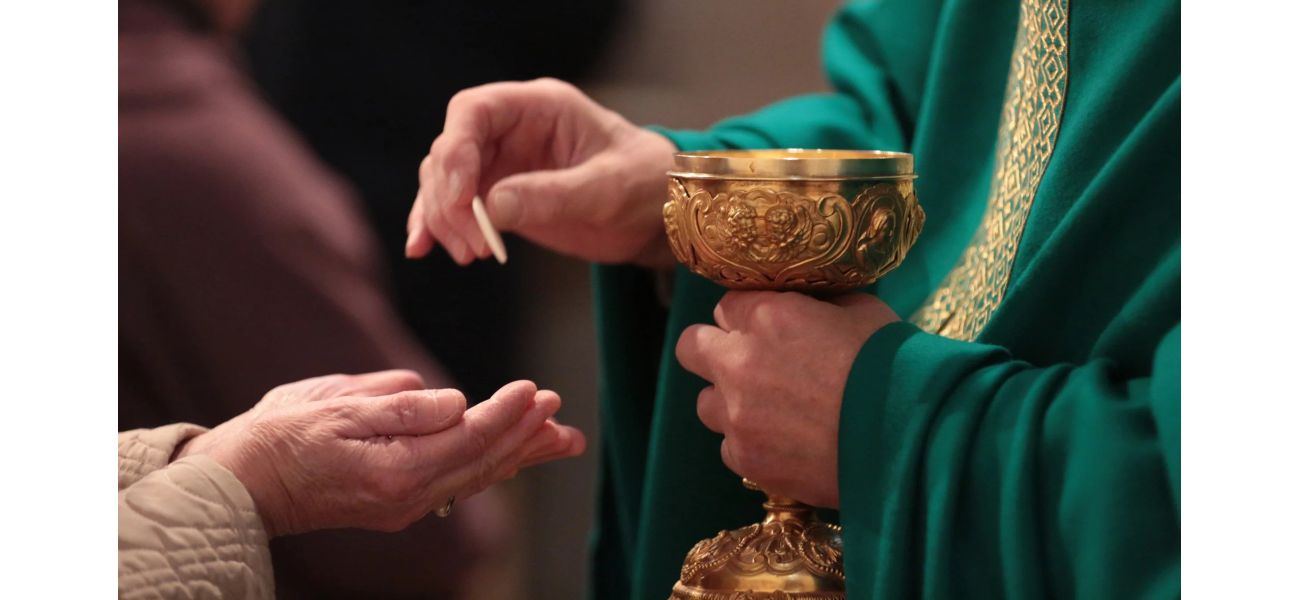Church of England requires proper wine for communion, no substitutes allowed.
A pastor requested that non-alcoholic wine and gluten-free wafers be permitted for use in the ceremony.
February 9th 2025.

The long-standing tradition of holy communion has recently faced criticism for its exclusion of individuals with coeliac disease, gluten intolerance, and those who abstain from alcohol. As the month of Dry January comes to an end, the Church of England has taken the opportunity to reiterate its stance on the use of non-alcoholic wine during the ritual.
According to the Church's governing body, only wine made from fermented grapes and bread made from wheat flour can be used for holy communion. This practice, which has been observed for centuries, symbolizes the body and blood of Jesus Christ. However, some have argued that this strict rule unfairly excludes those with severe gluten allergies or those who do not consume alcohol.
Reverend Canon Alice Kemp has spoken out against this "injustice of exclusion" and called for the Church to reconsider its restrictions. She highlighted the fact that individuals who are unable to consume both gluten and alcohol are often forced to receive only one element or may even be prohibited from receiving communion altogether.
The issue has come to light during the Church of England's General Synod, a five-day event where Church leaders gather to make decisions about rules and practices. While some alternative options, such as low-wheat communion wafers, are available, advocacy groups have pointed out that residue from gluten can still remain, causing discomfort for those with severe allergies.
Bishop Michael Ipgrave, chairman of the Church's Liturgical Commission, defended the use of wheat and alcohol in holy communion, stating that it is a long-standing tradition within the Church. He also reassured churchgoers who are unable to consume these elements that they can still fully participate in the sacrament through their faith.
In cases of necessity, such as with the sick or children, it is accepted for individuals to receive only one element during holy communion. However, the Church of England has also shown flexibility in the past, such as during the Covid pandemic when they allowed the use of individual cups instead of shared cups to prevent the spread of infection.
While the Catholic Church also follows the practice of using wheat flour and alcoholic wine during communion, they have approved the use of "low gluten" wafers. This shows that there is room for some flexibility within these traditional rituals. In the end, what truly matters is the participation and faith of the congregation, rather than the specific elements used during holy communion.
According to the Church's governing body, only wine made from fermented grapes and bread made from wheat flour can be used for holy communion. This practice, which has been observed for centuries, symbolizes the body and blood of Jesus Christ. However, some have argued that this strict rule unfairly excludes those with severe gluten allergies or those who do not consume alcohol.
Reverend Canon Alice Kemp has spoken out against this "injustice of exclusion" and called for the Church to reconsider its restrictions. She highlighted the fact that individuals who are unable to consume both gluten and alcohol are often forced to receive only one element or may even be prohibited from receiving communion altogether.
The issue has come to light during the Church of England's General Synod, a five-day event where Church leaders gather to make decisions about rules and practices. While some alternative options, such as low-wheat communion wafers, are available, advocacy groups have pointed out that residue from gluten can still remain, causing discomfort for those with severe allergies.
Bishop Michael Ipgrave, chairman of the Church's Liturgical Commission, defended the use of wheat and alcohol in holy communion, stating that it is a long-standing tradition within the Church. He also reassured churchgoers who are unable to consume these elements that they can still fully participate in the sacrament through their faith.
In cases of necessity, such as with the sick or children, it is accepted for individuals to receive only one element during holy communion. However, the Church of England has also shown flexibility in the past, such as during the Covid pandemic when they allowed the use of individual cups instead of shared cups to prevent the spread of infection.
While the Catholic Church also follows the practice of using wheat flour and alcoholic wine during communion, they have approved the use of "low gluten" wafers. This shows that there is room for some flexibility within these traditional rituals. In the end, what truly matters is the participation and faith of the congregation, rather than the specific elements used during holy communion.
[This article has been trending online recently and has been generated with AI. Your feed is customized.]
[Generative AI is experimental.]
0
0
Submit Comment





